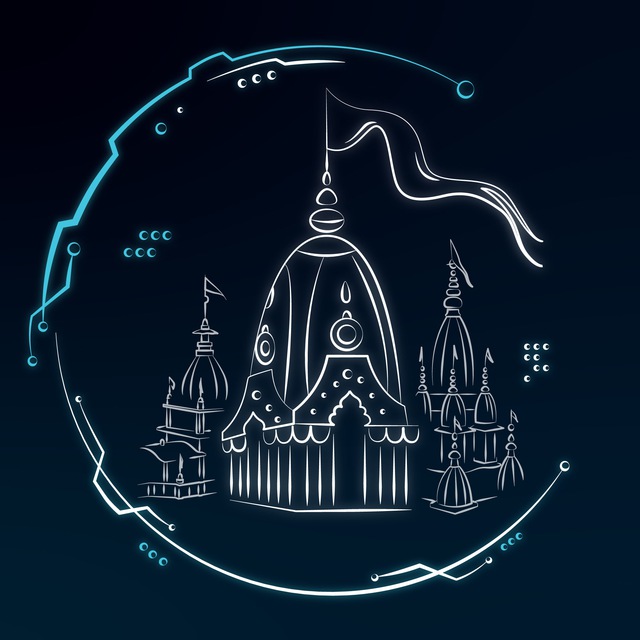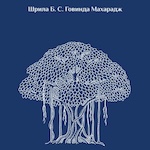«Рождение Кришны»
The Birth of Krishna
Journal ‘The Harmonist’
Edited by
Shrila Bhaktisiddhanta Saraswati Thakur
(No. 5, Vol. XXV, October 1927)
A LITTLE over five thousand years have elapsed since the advent of Lord Shri Krishna in this world. The Lord appeared in the region of Mathura at the conjunction of the Dvapara and Kali ages as Son of Vasudeva-Devaki.
The process of the Lord’s birth is thus described in the Shrimad Bhagabat. Shri Krishna having willed to be manifest in the world first appeared in the heart of Vasudeva and from his heart passed to the pure heart of Devaki. Nursed by her love in the form of maternal affection, like the waxing moon, Shri Krishna underwent gradual growth in the heart of Devaki. Subsequently, on the eighth lunar day of the dark fortnight of the month of Bhadra, on Wednesday, while the moon was in the constellation of Rohini, in the depth of night, from out of the heart of Devaki the Lord passed to her couch in the lying-in-chamber of Kamsa’s prison. Shri Krishna was born four-armed, holding the conch, disc, club and lotus, adorned with crest, pendant and other ornaments, wearing a great profusion of curls and clad in yellow robe.
The advent of the Lord did not in any way resemble the birth of a jiva. The birth of the supreme Lord, like all His manifestations, is eternal and transcendental. Shri Krishna ever manifests the lila His birth in the pure and unalloyed hearts of His devotees. The eternal and transcendental lila of His birth became visible in this mundane world towards the end of the Dvapara age.
The cause of His advent into the world is described in the following shloka of Shrimad-Bhagabat (3.2.15) —
sva-shanta-rupeshv itaraih sva-rupair
abhyardyamaneshv anukampitatma
paravaresho mahad-amsha-yukto
hy ajo ’pi jato bhagavan yathagnih
“His passionless nature, as represented by devotees like Vasudeva etc., being oppressed by opposed, perverted and terrible forms in the shape of daityas like Kamsa etc., like the kindling of fire by the rubbing of two pieces of fire-wood, the Lord of mundane and transcendental worlds, the kind-hearted Lord Shri Krishna, although devoid of phenomenal birth, joining with the Lord of Baikuntha, His byuha, the Prime Cause Purusha, His secondary Incarnations and other differing forms comes down into this world from His own sphere”.
The main cause of the appearance of Shri Krishna in this world is His wish to gratify the yearnings of those loving devotees who happen to be placed in this world; as no one except Godhead Himself has the power of satisfying the longings of His devotees. In order to delight Shrutadeva, Bahulashva and other bhaktas by the sight of Himself and for showing kindness to Vasudeva and others of His beloved ones by the destruction of the forces of danavas the supreme Lord was born in this world. This was the main cause. The prayer of Brahma and other gods for the relief of the world was a secondary cause of His birth.
The plenary Incarnation is not manifest until the main cause is about to fructify. At the time of the full Incarnation separate and partial Incarnations for relieving the Earth become superfluous. Just as on the occasion when the Suzerain Emperor himself marches out to conquest the vassal kings of different regions follow him as a matter of course, so also when Shri Krishna Himself appears in the world, His manifestations viz., the Lord of parabyom, His byuha (fourfold manifestations viz. Vasudeva, Sankarshana etc.), His secondary Incarnations such as Rama, Nrisingha, Baraha, Vamana, Nara Narayana etc., also appear simultaneously on the Earth with Shri Krishna. As thousands of sparks issuing out of a great fire are re-absorbed into it, in like manner all Incarnations having issued out of Shri Krishna are on His advent into this world re-absorbed into their original Source. Or again, just as for the conflagration of villages and towns the power of lamps and of a great fire are identical, but the full happiness, in the form of relief from the discomforts due to cold, can be obtained only from the great fire, — in like manner, although the relief of the Earth from oppressions may be effected equally by Purusha and secondary Incarnations, the supreme happiness of loving devotees cannot be afforded by any one except Shri Krishna Himself.
The jiva is born as the result of his karma and his birth is brought about by the power of maya which is alien to the nature of the jiva. The Godhead is born of His own will and by His own power which is eternally and inseparably joined with Himself. The power by which the Supreme Lord manifests His birth is eternal spiritual and full of transcendental bliss. Whereas the power by which the jiva is born is external to him and full of the triple misery. This difference has been described by the Lord Himself in the Geeta (4.9) —
janma karma cha me divyam
evam yo vetti tattvatah
tyaktva deham punar janma
naiti mam eti so ’rjuna
“My birth and actions are transcendental; those who know this truly are not born again on leaving the body; such persons attain to Me, o Arjuna.”
As the Lord is not born by entering into the vital fluid like jivas so also He has no mundane parents. We learn from the previous history of Shri Vasudeva-Devaki that in expectation of the birth of Shri Krishna, in their third previous birth in the manvantara (period of Manu) of Svayambhuba Manu, Vasudeva was a prajapati by name Sutapa and Devaki was known as Prishni. Having been commanded by Brahma to pro-create offspring they devoutly practiced tapas (austerities), controlling their senses, for the period of twelve thousand years of heavenly measure. The four-armed Shri Vishnu, thereupon, appeared in their hearts purified by devotion, and on expressing His willingness to confer any boon that was desired by them they prayed for a son like the Lord Himself; whereupon the Lord agreeing to be their son became known by the Name of ‘Prishnigarbha’, ‘Born in the womb of Prishni’. After this, in their second previous birth, when Sutapa and Prishni being reborn on the earth bore the names of Kashyapa and Aditi, then also Vishnu was born as their son Vamana, the younger brother of Indra and was known by the Names of ‘Upendra’ and ‘Vamana’. According to this account of the scriptures Vasudeva and Devaki would seem to have been mere jivas perfected by a course of spiritual efforts. But Vasudeva-Devaki the eternal parents of Shri Krishna can never be merely perfected jivas. Therefore, the efforts of Shri Vasudeva etc., as spiritual novices in their previous births were rendered possible by the will of God Himself for the edification of this world by the manifestations of Vasudeva etc. in the pure hearts of the devotees of Krishna. That is to say Vasudeva etc. are ever perfect and never practiced any courses of spiritual endeavor. But their portions attaching themselves to certain jivas practiced spiritual endeavors for the instruction of the world; and those portions were subsequently re-absorbed into the original. The accounts in the scriptures only express the fact that the original and its offshoots are identical in manifestation.
The above proves that the birth of the Supreme Lord Shri Krishna is transcendental. But from the history of His devotees in the Scripture it seems at first sight that they were born and suffered various troubles and miseries like ordinary jivas. If they were not like ordinary jivas how could miseries befall them on their appearance in this world in the train of God Himself?
What else are such occurrences as the incarceration of Devaki-Vasudeva in the prisons of Kamsa, the grief of the dwellers of Braja at separation from Krishna, the devoted attachment of Nanda and Yashoda for their son resembling that of mundane parents, etc.? The satisfactory solution of such complaints is realized by the jiva only when he is established in his proper self. The attendants of Godhead are the direct manifestations of His own power.
Their births etc. are the sports of God’s transcendental power, by the will of Shri Hari Himself they appear in this world as helpers of His lila. Their exhibitions of suffering etc. are only subtle methods of tasting the elixir of His lila. Those exhibitions are not the consequences of their selfish worldly enjoyments like the sufferings of this world. On the contrary, they add variety to the enjoyment of the delicious sweetness of the service of Krishna. The attachment of mundane parents for their short-lived son is merely the perverted reflection of the transcendental, wholesome and all-absorbing attachment of His original parents imbued with spiritual love for their eternal Son, Shri Krishna. The attachment of worldly parents for their ephemeral son being the selfish enjoyment of the fruits of karma, is altogether unwholesome and therefore, to be shunned. But the attachment of Nanda-Yashoda for their eternal Son is perfectly wholesome and worthy of being emulated by those possessed of transcendental love.
The author is unknown










































































































































